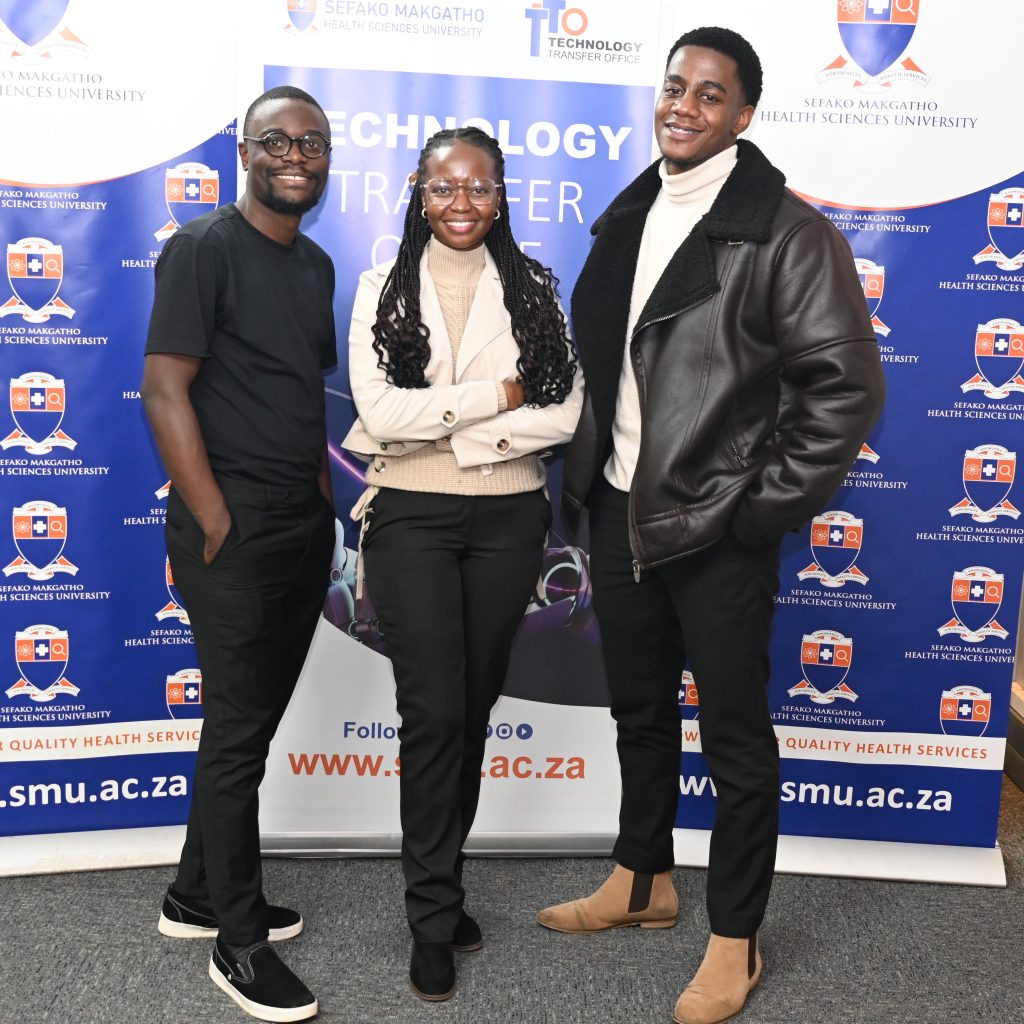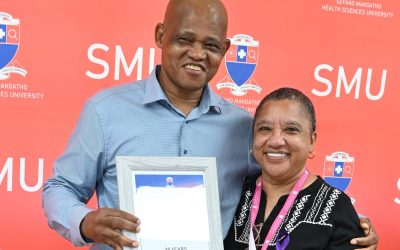At Sefako Makgatho Health Sciences University (SMU), a new wave of innovation is sweeping across the institution. Guided by the university’s core values of excellence, inclusivity, and social responsibility, three rising stars are emerging from the university’s ranks. Supported by the SMU Technology Transfer Office (TTO), they are not just advancing research; they are united in their mission to improve lives and transform healthcare, both in Africa and globally.
 These young innovators, Emmanuel Kiyonga, Thabo Lesiba Lekgoathi, and Nondumiso Nkosi, embody SMU’s commitment to fostering excellence and collaboration in health sciences while simultaneously honouring the institution’s values of inclusivity and social impact. Each of them has made a significant contribution to their field, and their discoveries have the potential to change the course of healthcare in ways that align with the university’s broader goals.
These young innovators, Emmanuel Kiyonga, Thabo Lesiba Lekgoathi, and Nondumiso Nkosi, embody SMU’s commitment to fostering excellence and collaboration in health sciences while simultaneously honouring the institution’s values of inclusivity and social impact. Each of them has made a significant contribution to their field, and their discoveries have the potential to change the course of healthcare in ways that align with the university’s broader goals.
28-year-old Ugandan Pharmacist Emmanuel Kiyonga’s breakthrough drug, Raloxifene Hydrochloride Solvate-Hydrate, is already being hailed as a game-changer in breast cancer treatment for postmenopausal women. His work, which focuses on providing a less invasive and more targeted alternative to existing treatments such as chemotherapy and hormone therapy, underscores SMU’s commitment to social responsibility, especially when it comes to addressing pressing global health challenges.
Kiyonga’s journey, which began with a desire to save lives, has already earned him considerable recognition, including R100,000 in prize money and the prestigious title of Studentpreneur 2024 at the Entrepreneurship Development in Higher Education (EDHE) Intervarsity programme. “Kiyonga’s work is a perfect example of how SMU’s values of excellence and social responsibility come together to create impactful innovations,” says Mohlatlego Sebola, who oversees the operationalisation of the TTO at SMU. “His research not only advances science but also addresses a significant gap in women’s healthcare.”
Kiyonga’s work reflects the ethos of SMU: a commitment to producing transformative research that serves society. “Through the support of the TTO, I’ve been able to bring my idea to life,” Kiyonga explains. “I’m proud to contribute to breast cancer treatment, knowing that it could help women live healthier lives.”
PhD candidate Thabo Lesiba Lekgoathi is a prime example of SMU’s emphasis on the fusion of indigenous knowledge and modern scientific innovation. Lekgoathi’s research centres on a medicinal plant, Schinus molle, which has been used in rural communities to treat respiratory ailments. His work, which led to the identification of geranylgeranyl acetate as a powerful inhibitor of SARS-CoV-2, is a testament to the university’s values of inclusivity and innovation.
Lekgoathi’s research, conducted under the mentorship of Dr Vuyisile Thibane and Professor Stanley Gololo from the Department of Biochemistry and Biotechnology, represents SMU’s focus on socially responsible research that not only draws from local knowledge but also has the potential to address global challenges like the COVID-19 pandemic. By blending traditional medicine with modern scientific methods, Lekgoathi is pushing boundaries in the fight against respiratory diseases and viral infections. His work exemplifies SMU’s belief that inclusivity in research leads to richer, more diverse scientific contributions.
“This innovation is about honouring traditional knowledge while moving science forward,” Lekgoathi says. “It’s about making a real difference, and the support I’ve received from SMU has been invaluable.”
Master’s student Nondumiso Nkosi has developed a diagnostic assay for Hepatitis B, aiming to address the significant gaps in testing accessibility, particularly in resource-limited settings. Nkosi’s diagnostic tool, developed in collaboration with Nagoya City University Hospital in Japan, perfectly aligns with SMU’s values of inclusivity and social responsibility. By providing a solution that is tailored to the unique healthcare challenges faced in Africa, Nkosi’s innovation reflects a strong commitment to improving public health in underserved communities.
Nkosi’s research focuses on creating diagnostic solutions that are not only affordable but also accessible, ensuring that individuals in remote or under-resourced areas can receive early detection and treatment for Hepatitis B. “The partnership with Nagoya City University Hospital was crucial in helping me develop a diagnostic tool that is suited to African healthcare needs,” Nkosi explains. “This innovation is about making a lasting impact where it’s needed most.”
Nkosi’s work represents SMU’s core value of social responsibility, demonstrating how innovation can drive positive change. “At SMU, we are encouraged to think about the greater good,” she adds. “This has been a driving force in my work.”
What unites Kiyonga, Lekgoathi, and Nkosi is not just their individual brilliance, but the sense of community and collaboration fostered by SMU. The support of the Technology Transfer Office (TTO), the mentorship they receive, and the university’s focus on interdisciplinary, inclusive research have been critical to their success.
Under the guidance of the TTO, these students are not only advancing their academic work but also positioning themselves to become leaders in the global healthcare and scientific landscapes. Their shared passion for innovation, social impact, and inclusivity reflects SMU’s mission to nurture talent that makes a difference in the world.
As Sebola puts it: “These three individuals embody the spirit of SMU. They are driven by excellence, committed to social responsibility, and united in their goal to improve the health and well-being of others. We are incredibly proud to support their journeys and look forward to seeing how their work continues to evolve.”
As these rising stars continue to make strides in their respective fields, they remain deeply rooted in the values that SMU stands for—excellence, inclusivity, and social responsibility. Their innovative research is not only changing the future of healthcare but also reinforcing SMU’s position as a leader in higher education that champions transformative, impact-driven research.
The work of Kiyonga, Lekgoathi, and Nkosi serves as a powerful reminder that, at SMU, the future of healthcare and science is bright, and it is united in its pursuit of a better, more inclusive world.
By Dimakatso Modise



